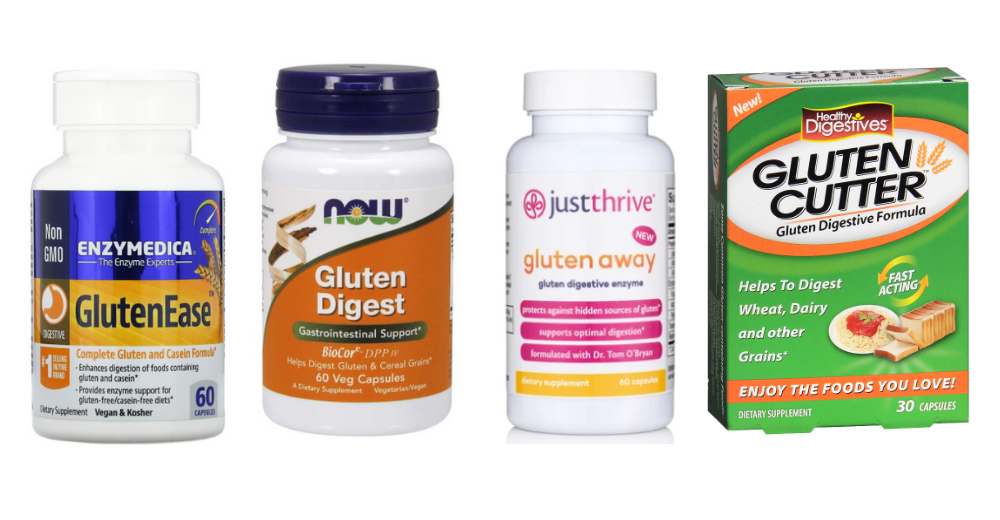
This article examines how digestive enzymes help people with gluten disorders, including celiac disease, gluten intolerance, and non-celiac gluten sensitivity. This article is for informational purposes and not a substitute for medical advice. This post contains affiliate links. Please see my disclosures and disclaimers.
If you’ve been in the gluten-free community long enough, chances are you’ve heard of digestive enzymes for gluten (known as glutenases or gluten pills). They’re marketed as natural dietary supplements and claim to help people more easily and quickly digest gluten, a protein found in wheat, barley, and rye.
If you’re one of the three million people with a medical condition known as celiac disease (aka, coeliac disease) or the 18 million people with non-celiac gluten sensitivity (aka, gluten intolerance) in the U.S., you’re probably intrigued by the potential of these so-called magical supplements.
Wouldn’t it be amazing to have access to a pill that allows you to eat a piece of wheat bread again?
How amazing would it feel not to worry about getting glutened every time you eat out?
And what a relief it would be not to be that person whose meal requires “special” attention everywhere you go.
While millions of gluten-challenged people hope for a magical pill that enables them to eat gluten again safely, the reality is that digestive enzymes may not live up to the hype, and they certainly don’t give a person with celiac disease or gluten intolerance permission to eat wheat again.
In this article, I explain how digestive enzymes work and how they may benefit — or hurt — someone who cannot eat gluten for medical or health reasons.

What Are Natural Digestive Enzymes?
Before we get into how gluten digestive enzymes work, I’d like to provide a general primer on digestive enzymes.
Digestive enzymes are chemicals found in both your saliva and digestive system organs. Your body naturally makes these digestive enzymes to aid in breaking down the proteins, carbohydrates, and fats from food.
Through both the chemical process of digestion (digestive enzymes) and the mechanical breakdown of food (chewing), your body effectively breaks down food into small, digestible molecules that are easily absorbed and fuel every cell and organ in your body.
Your body naturally produces several types of digestive enzymes, including:
- Amylase. This enzyme is mainly produced by saliva and helps to break down carbohydrates and starches.
- Maltase. Maltase is produced by the small intestine and aids in the breakdown of sugar (maltose and glucose), sugars your body uses for energy.
- Lactase. This enzyme breaks down the sugar found in milk (lactose).
- Lipase. Lipase is produced in the pancreas and aids in the breakdown of fats.
- Protease. Protease enzymes are produced in your stomach and pancreas and are essential for breaking down proteins. Remember, gluten is a protein found in wheat, barley, and rye. There are several types of protease, including pepsin, which is secreted by the stomach, and trypsin, which is secreted by the pancreas.
- Sucrase. This enzyme is found along the intestinal villi (the villi are the hair-like follicles that surround the small intestine and are typically damaged/flattened in people with celiac disease). Sucrase is used to break down sucrose into simple sugars (fructose and glucose), making them more easily absorbed by the body.
Some people don’t produce a sufficient amount of these natural enzymes due to genetics, injury, or illness, leading a person with enzyme deficiencies to experience poor digestion or gastrointestinal symptoms such as chronic or occasional gas, diarrhea, stomachaches, etc.
Unfortunately, some digestive disorders inhibit the body’s ability to produce these enzymes naturally. For example, a person with lactose intolerance doesn’t produce enough lactase to digest dairy products.
There are many foods that contain digestive enzymes, which can aid in digestion without any pill supplementation. These foods include but are not limited to the following:
- Apricots
- Avocados
- Bananas
- Ginger
- Honey (raw)
- Kiwi
- Mangoes
- Miso
- Papaya
- Pineapple
- Fermented foods (i.e. sauerkraut, kefir)
While eating foods high in digestive enzymes can aid in digestion, it may not be enough for people who lack these enzymes or suffer from digestive diseases. This is why many people in the gluten-free community choose to take a digestive enzyme supplement to help them digest small amounts of gluten they may inadvertently eat.
Editor’s Note: Please discuss digestive enzyme supplements with your doctor. Digestive enzymes are not intended to treat celiac disease or gluten sensitivity. They should be taken in conjunction with a strict gluten-free diet for anyone with a diagnosed gluten disorder.
How Digestive Enzymes Work
Digestive supplements that aid in digesting gluten have clever names – Gluten Ease, Gluten Digest, and Gluten Cutter and they’re easily accessible over the counter. But you might be wondering if they’re effective in helping celiac disease patients digest gluten.
Remember, gluten-specific digestive supplements contain protease enzymes, which help break down the proteins found in gluten into smaller chains of amino acids.
However, some experts, like Dr. Tom O’Bryan, say that the human body cannot create natural digestive enzymes to break down gluten fully. Dr. Tom is the leading gluten-sensitivity doctor in the world, and he told Dave Asprey that no enzyme produced by the body’s digestive tract is fully “capable of breaking down gluten.”
DAVE: No human protein digestive enzyme made by the pancreas or the liver is capable of breaking down gluten. You’re saying this is a definitive fact. Dr. Tom O Bryan who spent 30 years doing this. Everyone listening to this?
-Dave Asprey Interview with Dr. Tom O’Bryan
DR. TOM: That’s exactly right. The closest enzyme is called DPP4 and it can break down partially but no enzyme produced in the human digestive tract can break this down. It’s just the science! Just read the papers!
Researchers have furthered this premise by testing five commercially available gluten digestive enzyme supplements and concluded that “digestive enzyme supplements are ineffective in degrading immunogenic gluten epitopes.”
While the research doesn’t fully support the effectiveness of digestive enzymes, it shouldn’t negate the hundreds of testimonials saying digestive enzymes have helped them better tolerate gluten or feel better after eating.
Some people feel better after taking digestive enzymes because they aid in the overall breakdown and digestion of food. They typically contain a blend of enzymes, not just protease, as well as probiotics, all of which work together to aid in the breakdown of food and provide digestion relief.
It’s important to note that someone who says they feel better after taking a digestive enzyme may indeed feel better. But “feeling better” doesn’t mean damage isn’t being done.
If someone with celiac disease takes a gluten digestive enzyme and then purposefully eats a slice of wheat bread, they’re triggering an autoimmune response in their body that will damage their small intestine and deter nutrient absorption. If they have gluten intolerance and eat wheat, they’re triggering inflammation, and chronic inflammation leads to chronic disease.
In other words, a digestive enzyme may help to calm symptoms such as bloating, gas, and diarrhea, but they’re likely doing nothing to stave off intestinal damage and inflammation.
Are Gluten Digestive Enzymes Safe?
With the popularity of gluten digestive enzymes, many consumers wonder if these little gluten pills are safe.
Firstly, evaluating all claims, conducting due diligence, and talking to your doctor before taking any supplements are essential. It’s also important to note that claims made by digestive enzyme supplement companies are not evaluated nor regulated by the US Food and Drug Administration (FDA).
Furthermore, while digestive enzymes are known to aid in digestion, someone with celiac disease or gluten sensitivity should take them only in conjunction with a strict gluten-free diet.
One problem is that some gluten digestive enzyme claims send mixed messages, giving users false hope or security into thinking they’re protected when they eat gluten even though they’re not. Continued exposure to gluten, even small bits of it, puts someone at higher risk of getting more autoimmune diseases and serious disorders like cancer.
On top of it all, some experts suggest that taking digestive enzymes on a regular basis may cause the body to become dependent on them. This is because digestive enzymes trick your body into thinking it produces plenty of digestive juice when it’s not.
Over time, your body may stop naturally producing enzymes, potentially worsening digestion and resulting in a dependency on digestive enzymes. Please note I have no research to back up this claim fully. It’s just common sense.

When Should You Take a Digestive Enzyme?
Taking a digestive enzyme doesn’t permit you to eat gluten, and it should be used in conjunction with a strict gluten-free diet. However, there are several occasions where you might benefit from taking digestive enzymes:
(1) Eating at a Restaurant: Eating out often feels like playing Russian Roulette. Is the dish placed before you gluten-free, or does it contain bits of gluten cross-contamination? Can you trust your server and chef to understand gluten-free like you understand gluten-free?
In cases where you might be wary of the food placed before you, taking a gluten digestive enzyme may be helpful.
(2) Traveling: The likelihood of getting glutened while traveling is high, especially when eating out-of-the-norm foods and at new restaurants.
(3) Eating at a Friend’s House: Your friends have the best intentions regarding feeding you, but how can you know they were careful about reading labels and cooking on clean surfaces with clean pots and hands?
Taking a gluten digestive enzyme is like an insurance policy in these situations. You don’t plan to eat gluten, but if it happens, you at least know you have a little help in breaking down the forbidden protein.
Brands of Digestive Enzymes for Gluten
There are many brands of gluten digestive enzymes on the market today, and consumers should carefully evaluate each brand’s claims.

GlutenEase
GlutenEase is a digestive enzyme supplement containing amylase, protease, and Dipeptidyl Peptidase IV (DDP-IV), a form of protease that breaks down gluten and aids in the digestion of proteins.
The manufacturer of GlutenEase says on its website, “DPP-IV is intended for those sensitive to gluten who are already following a gluten-free diet but may need help breaking down gluten proteins that are unintentionally ingested.” You can purchase GlutenEase on Amazon.
Gluten Digest
Gluten Digest by NOW Foods also contains DPP-IV, along with protease and amylase enzymes, and is marketed as helping to digest gluten and cereal grains. You can purchase Gluten Digest on Amazon.
Gluten Cutter
Gluten Cutter is promoted as a digestive enzyme supplement that aids in the breakdown of gluten found in wheat and assists in the breakdown of hard-to-digest foods. You can purchase Gluten Cutter on Amazon.
Gluten Away
Gluten Away is one of the pricier digestive enzyme options because it also contains a blend of probiotics and digestive enzymes. If you already take a probiotic, you may want to consider using a different brand of digestive enzymes. You can purchase Gluten Away on Amazon.
Wheat Rescue
Wheat Rescue is a combination of digestive enzymes and probiotics developed by Dr. Tom O’Bryan and his team. Dr. Tom is an expert on gluten sensitivity, the author of The Autoimmune Fix, and the foreword writer of my book, Dear Gluten, It’s Not Me, It’s You.
Wheat Rescue contains DPP-IV and Tolerase G, which are enzymes that assist in the breakdown of glutenin and gliadin proteins, the building blocks of gluten. It also includes a combination of probiotic spores and yeast that support intestinal health and barrier function. You can purchase Wheat Rescue from Dr. Tom’s website.

Current Clinical Trials
In early 2023, Takeda Pharmaceuticals launched the Illuminate-062 Study, a Phase 2 clinical trial for TAK-062, a gluten-digesting enzyme. The clinical trials are taking place in the United States, Canada, and Europe.
TAK-062 is designed to break down the proteins that result in intestinal damage in celiac patients. Earlier clinical trials found that in study participants who consumed three grams of gluten (about two slices of bread), TAK-062 was able to break down 98 percent of the gluten protein.
Like other digestive enzymes, TAK-062 doesn’t replace a gluten-free diet. Instead, it protects against cross-contact and aids in the digestion of gluten when a person accidentally consumes gluten.
The Bottom Line on Digestive Enzymes
A digestive enzyme isn’t a cure-all treatment that enables someone with a gluten disorder to throw caution to the wind and eat gluten. Instead, such enzymes are used in adjunct with a gluten-free diet, particularly before eating out, traveling, or eating at a friend’s house.
A strict gluten-free diet remains the only treatment for celiac disease and gluten sensitivity. While digestive enzymes may help manage the symptoms associated with eating gluten, they only “mask” symptoms and don’t mitigate internal damage.
Digestive enzymes should not be used to treat a gluten disorder or give permission to eat gluten; rather, it’s a symptom reliever in times of getting accidentally glutened.
Discuss digestive enzymes with your healthcare provider and evaluate all claims carefully.
(Please note that digestive enzymes are not for people with “gluten allergies” or those who have an allergic reaction to wheat or other components of gluten.)
Additional Reading
For strategies for eating out safely without compromising your gluten-free diet, download The Ultimate Guide to Eating Out Gluten-Free.
If you need to go gluten-free fast or want to fast-track your healing, enroll in my SIGNATURE Gluten-Free Course – the #1 course for people with celiac disease and gluten intolerance.
You might benefit from reading these articles, too:
- Supplements for Celiac Disease and Gluten Intolerance
- 27 Practical Tips for Traveling Gluten-Free
- 10 Tips for Hosting Your Gluten-Free Friend for a Meal
- 5 Dangers Associated with the Gluten-Free Diet
- Crap! I Was Glutened. How Long Until It Clears My System?
- 7 Ways to Recover from an Accidental Gluten Episode
- 7 Promising Celiac Disease Treatment Options on the Horizon
- 21 Struggles Only Gluten-Free People Will Understand
- What Happens If You Eat Gluten With Celiac Disease?

I would talk to your doctor and nutritionist about your unique situation. I offer a bit of guidance on genetic issues in this article. https://www.goodforyouglutenfree.com/genetic-testing-for-celiac-disease/
For an individual with two copies of the HLA-DQ 3.1 (subtype 7.5) gene do you recommend also rotating or avoiding corn, rice, millet and oat glutens? Thanks, Patty
I’m sorry you’re struggling. Your body needs time to heal and the bloat should subside. There are many strategies for healing the gut on my site, but I always recommend talking to your dr.
What about Celiac bloat? How do get rid of celiac belly? Gluten free for 10 months and no change, NOT intolerant to dairy. But gut wont disappear, any suggestions?
Hi, Jenny. Did you know that Dr. Tom sells (and I believe helped develop) two different gluten-digesting enzymes?
See them here (both pages include a video of Dr. Tom talking about them):
– E3 Advanced Plus – https://shop.thedr.com/e3-advanced-plus.html
– Wheat Rescue – https://shop.thedr.com/catalog/product/view/id/14989/s/wheat-rescue/
xo
We will look into it
It is unfortunate, that this publication has not evaluated and written about AN-PEP. While it is not intended to be used to intentionally eat gluten, there are multiple studies that it is the most effective enzyme currently available (unlike DPP-IV) and has laboratory and clinical evidence that it can break down the proline bindings of the immunogenic component of gliadin (alpha 33mer and 26 mer epitopes). Stanford and the Mayo Clinic are both studying currently enzymatic degradation of gliadin.